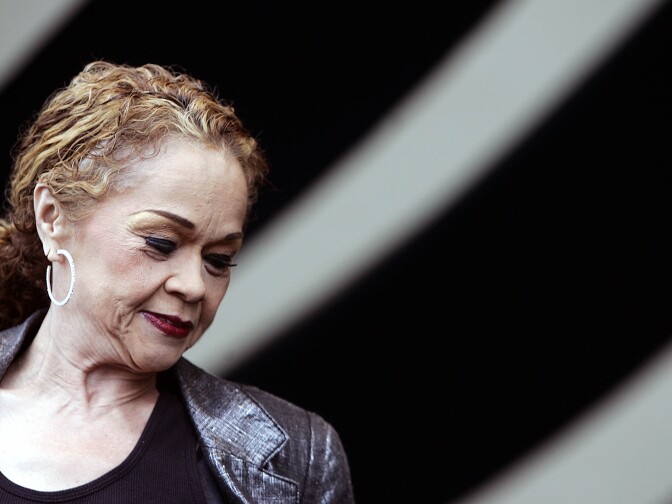This story is free to read because readers choose to support LAist. If you find value in independent local reporting, make a donation to power our newsroom today.
This archival content was originally written for and published on KPCC.org. Keep in mind that links and images may no longer work — and references may be outdated.
Etta James dies at 73 in Riverside after struggle with leukemia (photos, videos)
Rhythm and blues legend Etta James, who lived in Riverside, has died after a struggle with leukemia. She was 73.
Her birth was the stuff of the blues: She was born Jamesetta Hawkins to an unwed teenage prostitute in Los Angeles. James never knew her father.
Her first break came when her grandparents signed up 5-year-old Jamesetta to sing with the church choir. At 12, she was back with her mother in San Francisco. She told NPR’s Terry Gross that she got her first taste of rhythm and blues there.
“Oh, I was listening to a little stuff on the sly but I wasn't interested in secular music. But in San Francisco, I like, I grew horns and a tail. I really turned into, you know, the real street kid. I was kind of like a runaway, but I had a mother," she told Gross.
James formed her first singing group at age 14. Her mother disapproved, so Jamesetta split.
“And I went and I stayed with two girls, one named Abby and Jean, who later became The Peaches, you know," she said.
The Peaches signed with bandleader Johnny Otis, who passed away this Tuesday. He told Jamesetta to ditch “Hawkins” and switch her first name around. “Etta James and The Peaches. And we had wrote an answer to the song “Work With Me, Annie,” she said.
“Roll with Me Henry” rocketed to the top of the R&B charts, but with a different title.
“During those days you weren't allowed to say ‘roll’ because roll was like a vulgar word. You know, think about it. They would probably burn Prince at the stake! What we had to do was sell it underground and change the title to ‘Wallflower’ so that all the kids could go buy it and listen to it," she said.
James signed with Chess Records. In the early 60s, she recorded her most celebrated work.
“She infused everything she did with the blues. But Etta’s blues came out of a deep agony of the soul,” said music writer David Ritz, who collaborated with James on her autobiography: “Etta James: A Rage to Survive.”
“And I think the pain she felt about being abandoned was all there in her music. The pain is evident. And I think the other thing she had is a willingness to express herself with such emotional extravagance. I mean, there is no holding back," he said.
By the early 70s, drugs and alcohol and drugs took a toll. She told Gross she finally hit bottom.
“When I stopped using, you know, I wasn't the kind that went around and wanted people to pat me on the back about it. I just picked up the ball and started running with it," she said.
Her comeback culminated in 1988 with “Seven Year Itch” — her first new album in more than 10 years. The second track off her comeback album:
Not long after, James moved to Riverside’s Woodcrest district. Inducted into the Rock and Roll Hall of Fame in 1993, she influenced a new generation of singers — including Beyonce Knowles, who depicted James in a 2008 film about the Chess years called “Cadillac Records.”
James battled leukemia, kidney disease and dementia in her final years. But poor health didn’t keep her from singing. Her final album — “The Dreamer” — was released in November. The first track off her final album:
“She made it through on her sense of humor, her resilience on her sense of her own power and worth," said NPR's pop music critic Ann Powers. “Even though she definitely had a tough life she was so, so alive. And it’s a much dimmer world if she’s left it."
Correction: The previous version of this article cited Ann Powers as the Los Angeles Times' pop music critic. She is pop music critic for NPR.













